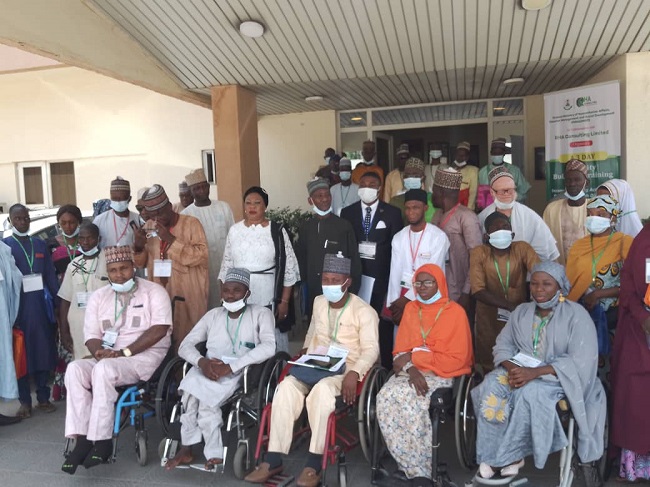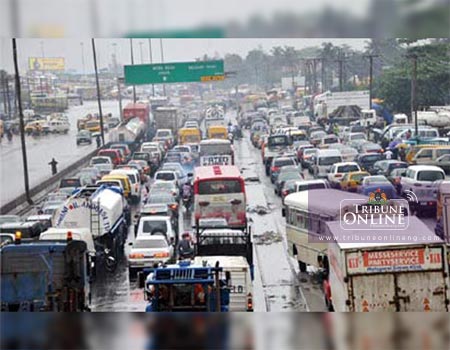FG empowers PLWDs with skills to mitigate climate change
The Ministry of Agriculture and Rural Development organized a workshop to strengthen the skills and competences of people living with disabilities (PLWD) on mitigation and adaptation strategies to deal with climate change.
The Permanent Ministry of Agriculture and Rural Development, Dr. Ernest Umakhihe during the workshop on Mainstreaming Gender in Climate Change: Climate Change Adaptation and Mitigation Strategies for Women People with Disabilities (PWD) said that climate change is a long-lasting variation in the global climate in response to natural and human factors and has a devastating effect on agriculture.
He said the National Gender Policy in Agriculture (NGPA) has been launched and the inauguration of the National Gender Steering Committee for the implementation of the policy demonstrates the ministry's commitment to address the concerns of persons with disabilities and women in the agricultural sector.
Furthermore, Dr. Umakhihe noted that the impacts of climate change, such as drought, floods, extreme weather events, reduced food and water security, and loss of agricultural land affect men and women differently. , with women and people with disabilities being the most vulnerable. vulnerable group.
"The objective of this workshop is therefore to strengthen the skills and competences of persons with disabilities on mitigation and adaptation strategies to deal with climate change and its impacts in accordance with the Sustainable Development Goal (SDG13).
“At the 2012 United Nations Conference on Sustainable Development (Rio+20), the General Assembly called on United Nations entities to address environmental sustainability and climate change, and to promote gender equality gender.
“The current administration has repositioned agriculture as a business and as an alternative to oil with a return on investment for smallholder farmers, including people with disabilities.
“Gender mainstreaming, which involves addressing the concerns of men, women and people with disabilities in agriculture, remains fundamental to empowerment, economic growth and poverty reduction, where concerns of all segments of society are taken into account,” he noted.
Umakhihe affirmed that the Federal Ministry of Agriculture and Rural Development is committed to the socio-economic empowerment of PLWD and women in the sector through the NGPA as a prerequisite for eradication poverty and promoting sustainable human development.
Furthermore, the ministry's director of special functions, Ms. Fausat Lawal, said there was a need to mainstream gender in climate change, which includes assessing the implications for women and men, including people with disabilities, of any planned action and to ensure that their concerns.
ALSO READ FROM NIGERIAN TRIBUNE
Etebo awaits Aris debut on Sunday Ukraine joins Spain and Portugal's 2030 World Cup bidfgPLWD

The Ministry of Agriculture and Rural Development organized a workshop to strengthen the skills and competences of people living with disabilities (PLWD) on mitigation and adaptation strategies to deal with climate change.
The Permanent Ministry of Agriculture and Rural Development, Dr. Ernest Umakhihe during the workshop on Mainstreaming Gender in Climate Change: Climate Change Adaptation and Mitigation Strategies for Women People with Disabilities (PWD) said that climate change is a long-lasting variation in the global climate in response to natural and human factors and has a devastating effect on agriculture.
He said the National Gender Policy in Agriculture (NGPA) has been launched and the inauguration of the National Gender Steering Committee for the implementation of the policy demonstrates the ministry's commitment to address the concerns of persons with disabilities and women in the agricultural sector.
Furthermore, Dr. Umakhihe noted that the impacts of climate change, such as drought, floods, extreme weather events, reduced food and water security, and loss of agricultural land affect men and women differently. , with women and people with disabilities being the most vulnerable. vulnerable group.
"The objective of this workshop is therefore to strengthen the skills and competences of persons with disabilities on mitigation and adaptation strategies to deal with climate change and its impacts in accordance with the Sustainable Development Goal (SDG13).
“At the 2012 United Nations Conference on Sustainable Development (Rio+20), the General Assembly called on United Nations entities to address environmental sustainability and climate change, and to promote gender equality gender.
“The current administration has repositioned agriculture as a business and as an alternative to oil with a return on investment for smallholder farmers, including people with disabilities.
“Gender mainstreaming, which involves addressing the concerns of men, women and people with disabilities in agriculture, remains fundamental to empowerment, economic growth and poverty reduction, where concerns of all segments of society are taken into account,” he noted.
Umakhihe affirmed that the Federal Ministry of Agriculture and Rural Development is committed to the socio-economic empowerment of PLWD and women in the sector through the NGPA as a prerequisite for eradication poverty and promoting sustainable human development.
Furthermore, the ministry's director of special functions, Ms. Fausat Lawal, said there was a need to mainstream gender in climate change, which includes assessing the implications for women and men, including people with disabilities, of any planned action and to ensure that their concerns.
ALSO READ FROM NIGERIAN TRIBUNE
Etebo awaits Aris debut on Sunday Ukraine joins Spain and Portugal's 2030 World Cup bidfgPLWD
What's Your Reaction?






















